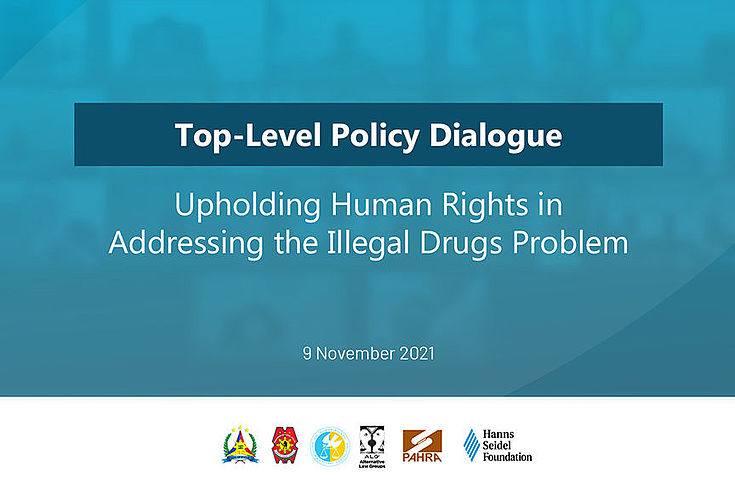Community-based Dialogue Project
Top-Level Policy Dialogue on the Illegal Drugs Problem
HSF
The objective was to discuss the illegal drugs problem including existing and alternative approaches/ measures in addressing it to promote and protect human rights.
More than 30 participants joined the virtual activity representing the government and members of civil society, among others. They acknowledged the value of the CBD in exploring and pursuing options for a viable, sustainable and responsive approach in cooperation with critical stakeholders.
Key resource persons/presentors from the Commission on Human Rights (Executive Director Atty. Jacqueline de Guia); Philippine Alliance of Human Rights Advocates (Secretary General Ellecer Carlos); NoBox Transitions Foundation Philippines (Founder and Director Ma. Inez Feria); Department of Health (Chief of Hospital II Dr. Jose Bienvenido Leabres); and Philippine National Police-Philippine Drug Enforcement Group (PDEG Legal Investigation Division OIC Police Lt. Col. Darwin Clark) shared invaluable ideas, insights and recommendations.
Mr. Ellecer Carlos shared findings of the 2017-2021 documentation of extrajudicial killings (EJK) and other human rights violations committed in the context of the “war on drugs.” The information include a profile of victims as alleged by informants, modalities and patterns of violations committed by alleged perpetrators/assailants/offenders, multidimensional impacts, and an alternative policy reform shift.
Atty. Jacqueline de Guia gave a report on CHR investigations related to the anti-illegal drugs campaign (with analysis on regions NCR, III, & IV-A) between January 2016 and July 2019. Key information dealt with the number of killed victims, number of incidents with killings, number of investigated drug-related killings per month, law enforcement operations, non-law enforcement operations, conclusions, and recommendations for concerned government agencies and international organizations.
Ms. Ma. Inez Feria presented an alternative approach in addressing the illegal drugs problem, i.e., the harm reduction framework and integrated response. She explained that this framework or perspective looks at social, economic and environmental factors/drivers, and that the use of illegal drugs is only part of the problem. She added that understanding the context/situation of a person using illegal drugs is important, not to mention the assistance s/he has received. She suggested on shifting from a goal of drug-free society to building community health and well-being, noting that a drug dependent is a member of the community. Given this, she stressed that interventions should be person-focused not program-focused (not time-bound), active participants in the process (both provider & recipient), and create a supportive environment (e.g., policies, opportunities). An integrated harm reduction response with proper systems in place was likewise underscored (e.g., assessment, treatment, services, drug education, etc.).
Dr. Jose Leabres presented the mandates and initiatives of the DOH anchored on R.A. 9165 (Comprehensive Dangerous Drugs Act of 2002) and R.A. 11223 (Universal Health Care). He noted in his presentation the DOH drug abuse treatment and rehabilitation centers, outpatient rehabilitation centers and recovery clinics, community-based rehabilitation program, ongoing plans, and accreditation training of drug rehabilitation practitioners.
Police Lt. Col Darwin Clark reported the accomplishments of PDEG in line with its mandate in the enforcement of R.A. 9165 as amended (R.A. 10640), through its drug reduction strategy.
The presentations as well as sharing of experiences and insights in between and during the open forum were informative and helpful in working towards a safer and more humane environment for illegal drug users, law enforcement, and the general public.
The CBD project is a partnership of the Commission on Human Rights (CHR), Philippine National Police (PNP), Armed Forces of the Philippines (AFP), Alternative Law Groups (ALG), and Philippine Alliance of Human Rights Advocates (PAHRA), with support from the Hanns Seidel Foundation/Germany (HSF).

